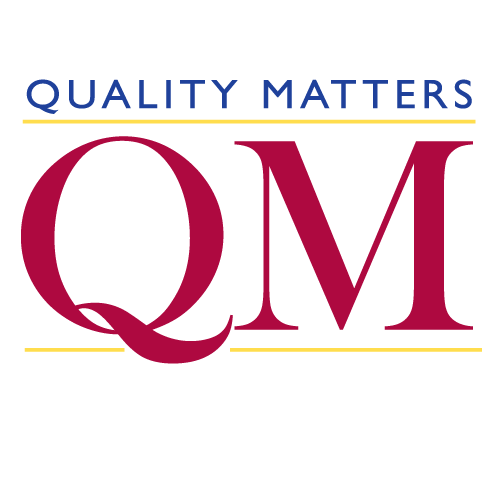Quality Matters Releases New Higher Education Rubric, Seventh Edition to Support Educators in Creating More Accessible, Inclusive Courses for Learners
Industry: Education
In addition to including synchronous online and continuing education courses, this edition offers new research-supported Standards for fostering a sense of belonging, maintaining academic integrity and more.
Annapolis, MD (PRUnderground) July 5th, 2023
Quality Matters (QM) is pleased to announce the release of the QM Higher Education Rubric, Seventh Edition, a new update to the widely used, community-created Standards for quality in course design for higher ed online and hybrid courses.
The QM Higher Education Rubric, Seventh Edition encompasses the latest revision of the widely used QM Standards, which provide a framework for assessing quality at the higher education level. Adherence to these Standards is primarily assessed through a process of peer review. The QM Rubric is widely recognized as the “gold standard” of quality in online learning, due in part to its emphasis on learner perspective. By prioritizing the needs of learners, QM Standards aim to open pathways for educators to create courses that are clearer, more welcoming and more accessible for learners.
As the latest major step in the pursuit of this goal, the Seventh Edition features notable revisions designed to foster more meaningful and effective learning experiences. “The changes in the Seventh Edition provide the most current research-supported practices that online programs need for today’s learners,” said Brenda Boyd, QM’s Vice President Program Services and Co-Chair of the QM Higher Education Rubric, Seventh Edition Committee.
The Seventh Edition’s updates include a focus on a student’s sense of belonging, which recent research indicates plays a larger role in learning outcomes than previously thought. “It’s becoming clear that there are connections between outcomes like completion and a learner’s feelings of belonging and the ability to see a representation of themself in their courses,” said Boyd. Emphasis was also placed on accessibility and equity. “The pandemic elevated the value of empathy for the diverse characteristics, needs and lived experiences of learners, as well as surfacing concerns about equitable access to resources, tools and prior academic or institutional knowledge that contribute to successful outcomes,” said Amanda Hardman, Senior Learning Designer for the Colorado Community College System and member of the QM Higher Education Rubric, Seventh Edition Committee. The Seventh Edition addresses these concerns through Standards that include quality course design elements such as accessible text and images and the presence of a variety of perspectives and representations.
Other significant improvements include an expansion of the types of courses covered by the Rubric. The Seventh Edition now allows for the review of synchronous online courses — conducted live via virtual class meetings — as well as continuing education courses. A new Standard was added to the Rubric to help learners understand how academic integrity policies are applied in their assessments, an addition more relevant than ever as the availability of generative AI tools has sparked renewed concerns regarding scholastic plagiarism. Existing Standards have been clarified to specifically and separately call for accessibility in both text and images in an effort to promote the inclusion of diverse learners. Additionally, nomenclature has been updated to reflect current terminology, such as in the changing of “blended” courses to the more contemporary term, “hybrid” courses.
The Seventh Edition is the result of nearly two years of community feedback, review and collaboration conducted in the spirit of QM’s philosophy of “continuous improvement.” This rigorous update process was carried out by the QM Higher Education Rubric, Seventh Edition Committee, a body of 16 professionals spanning disciplines, institutional types and areas of expertise from across the world of higher education, including online teaching faculty, administrators, researchers, and design and technology staff. The QM Rubric is regularly updated by educators from the QM Community in order to maintain relevance and alignment with current best practices as the landscape of education and the needs of learners change over time.
One of the primary goals of QM’s quality assurance process is to provide educators with inroads for putting educational theory into practice. As such, the Standards that make up the QM Higher Education Rubric are supported by ongoing academic research. In developing the Seventh Edition, this deep review of current research informed decisions about which elements of the existing QM Standards remained relevant and which required revision. Particular attention was paid to research on inclusivity, hybrid learning and synchronous online education. This research was compiled into an annotated bibliography which was provided to the Seventh Edition Committee to inform its work.
To derive the updates present in the Seventh Edition, the committee aggregated the results of this research, as well as a survey of hundreds of educators from the QM community, current best practices, insights derived from peer reviews conducted using prior editions of the QM Higher Education Rubric, and the experiences of committee members. The result is a set of clear, concise and meaningful revisions to the Rubric. These updates and others offer educators new, research-supported perspectives and opportunities, making it easier than ever before to design and improve courses to meet the needs of learners. “Ultimately, we hope that our learners are unencumbered by design structure,” said Hardman. “The goal is to make sure learners can focus instead on the opportunities the course design presents to engage with the content and successfully achieve learning outcomes.”
The QM Higher Education Rubric, Seventh Edition Workbook contains the fully annotated Rubric. It is available for QM members via the organization’s website.
About Quality Matters
Grounded in research. Driven by best practices. A community that puts learners first. Quality Matters (QM) is the global organization leading quality assurance in online and innovative digital teaching and learning environments. It provides a scalable quality assurance system for online and blended learning used within and across organizations. When you see QM Certification Marks on courses or programs, it means they have met QM Course Design Standards or QM Program Review Criteria in a rigorous review process.



